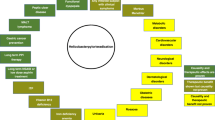Abstract
Helicobacter pylori and nonsteroidal anti-inflammatory drugs (NSAIDs) are associated with adverse gastrointestinal effects ranging from mild dyspepsia to serious complications such as bleeding peptic ulcer. However, controversy persists regarding the interaction between these two well-documented risk factors. Physiology studies reveal that H. pylori infection can protect the upper gastrointestinal tract by increasing prostaglandin levels. In contrast, clinical trial evidence suggests that eradication of H. pylori infection leads to a decreased risk for endoscopic ulcers in people taking NSAIDs. Given the rates of morbidity and mortality and costs attributable to NSAID-associated toxicity, preventive strategies to reduce NSAID side-effects remain important. Until controlled investigations definitively quantify the effect of H. pylori infection and eradication on clinically significant adverse events, a compelling argument can be made for H. pylori testing of chronic NSAID users at increased risk for ulcer disease and eradicating the organism if present.
Similar content being viewed by others
References and Recommended Reading
Hawkey CJ. Personal review: Helicobacter pylori, NSAIDs and cognitive dissonance. Aliment Pharmacol Ther 1999, 13:695–702.
Delvalle J, Scheiman JM, Cohen H, Laine L: Peptic ulcer disease. In Textbook of Gastroenterology, edn 3. Edited by Yamada T. Philadelphia: Lippincott, William & Wilkins; 1999:1370–1444.
Wolfe MM, Lichtenstein DR, Singh G: Gastrointestinal toxicity of nonsteroidal anti-inflammatory drugs. N Engl J Med 1999, 340(24):1888–1899. Concise review of the pathophysiology and clinical consequences of nonsteroidal anti-inflammatory drug-related adverse events.
Scheiman JM: NSAIDs, gastrointestinal injury, and cytoprotection. Gastroenterol Clin North Am 1996, 25:279–298.
Wilcox CM: Relationship between nonsteroidal antiinflammatory drug use, Helicobacter pylori, and gastroduodenal mucosal injury. Gastroenterology 1997, 113:S85-S89.
Aalyke C, Lauritsen JM, Hallas J, Reinholdt S, Krogfelt K, Lauritsen K: Helicobacter pylori and risk of ulcer bleeding among users of nonsteroidal anti-inflammatory drugs: a case-control study. Gastroenterology 1999, 116:1305–1309.
Chan FK, Sung JJ, Chung SC, et al.: Randomised trial of eradication of Helicobacter pylori before non-steroidal anti-inflammatory drug therapy to prevent peptic ulcers. Lancet 1997, 350:975–979. This clinical investigation is the best evidence for routine H. pylori screening in all users of nonsteroidal anti-inflammatory drugs. Reduction in endoscopic ulcers are impressive, but no data on clinical events are presented.
Hawkey CJ, Tulassay Z, Szczepanski L, et al.: Randomised controlled trial of Helicobacter pylori eradication in patients on non-steroidal anti-inflammatory drugs: HELP NSAIDs study. Lancet 1998, 352:1016–1021. Trial that demonstrated that Helicobacter pylori infection can be protective in healing nonsteroid anti-inflammatory drug-related gastric ulcers.
Chan FKL, Sung JJY, Suen BY, et al.: Prospective randomized trial of H. pylori eradication versus maintenance omeprazole to prevent recurrent upper gastrointestinal hemorrhage in high-risk aspirin and non-aspirin NSAID users. Gastroententerol 2000, 118:A194.
Yeomans ND, Tulassay Z, Juhasz L, et al.: A comparison of omeprazole with ranitidine for ulcers associated with nonsteroidal antiinflammatory drugs. N Engl J Med 1998, 338:719–726.
Hawkey CJ, Karrasch JA, Szczepanski L, et al.: Omeprazole compared with misoprostol for ulcers associated with nonsteroidal antiinflammatory drugs. N Engl J Med 1998, 338:727–734.
Chan FK, Sung JJ, Suen R, et al.: Does eradication of Helicobacter pylori impair healing of nonsteroidal anti-inflammatory drug associated bleeding peptic ulcers? A prospective randomized study. Aliment Pharmacol Ther 1998, 12(12):1201–1205.
Bombardier C, Laine L, Reicin A, et al.: Comparison of upper gastrointestinal toxicity of rofecoxib and naproxen in patients with rheumatoid arthritis. N Engl J Med 2000, 343:1505–1584.
Scheiman JM, Bandekar RR, Chernew ME, Fendrick AM: H. pylori screening for individuals requiring chronic NSAID therapy: Should we kill the bug if you need the drug? Aliment Pharm Ther 2000, In press. Symptom-based cost-effectiveness analysis that explicitly compares the clinical and economic tradeoffs between incremental costs of H. pylori screening and adverse event prevented attributable to H. pylori eradication.
Author information
Authors and Affiliations
Rights and permissions
About this article
Cite this article
Fendrick, A.M., Scheiman, J.M. Helicobacter pylori and NSAID gastropathy: An ambiguous association. Curr Rheumatol Rep 3, 107–111 (2001). https://doi.org/10.1007/s11926-001-0005-6
Issue Date:
DOI: https://doi.org/10.1007/s11926-001-0005-6




